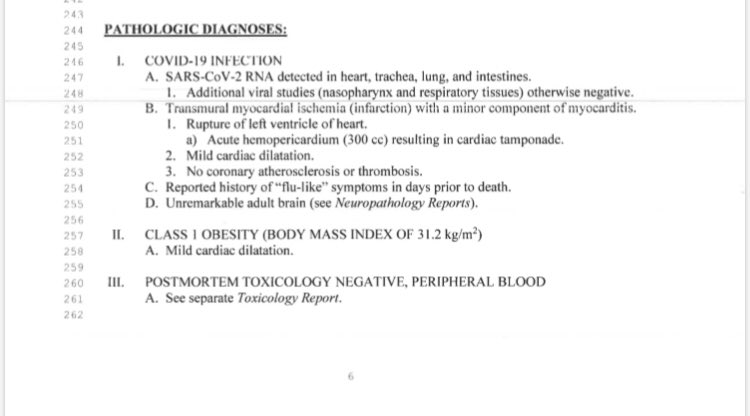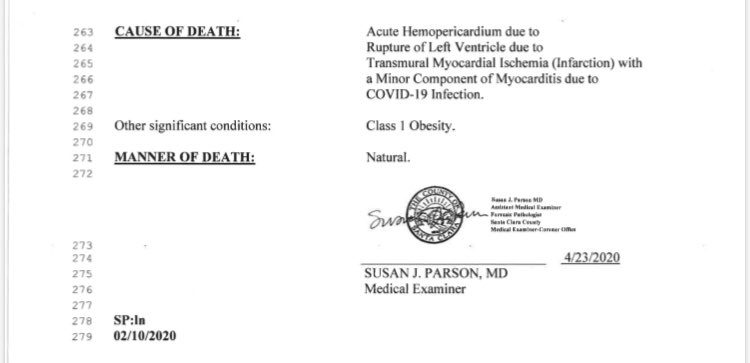Autopsy of the first US COVID-19 Death
-
Does I. B. mean that the person had a heart attack?
-
Does I. B. mean that the person had a heart attack?
@taiwan_girl said in Autopsy of the first US COVID-19 Death:
Does I. B. mean that the person had a heart attack?
"Heart attack" is a vague term.
Here's what probably happened. The virus caused blood flow to the part of the heart muscle to stop (Was it a clot? I don't know). With the flow to the muscle impaired, the muscle died, and it cause such weakness that it "blew out."
"Transmural" means the interruption to blood flow affected the muscle through the depth of the cardiac muscle. This is a very bad thing. A "transmural myocardial infaction" is pretty common, but if its size is significant, it can be a quickly fatal event.
I've only seen one case like this. It's sudden, catastrophic, and almost uniformly fatal. It's like a balloon popped. There's no way to fix that.
Hope that clears it up.
-
@taiwan_girl said in Autopsy of the first US COVID-19 Death:
Does I. B. mean that the person had a heart attack?
"Heart attack" is a vague term.
Here's what probably happened. The virus caused blood flow to the part of the heart muscle to stop (Was it a clot? I don't know). With the flow to the muscle impaired, the muscle died, and it cause such weakness that it "blew out."
"Transmural" means the interruption to blood flow affected the muscle through the depth of the cardiac muscle. This is a very bad thing. A "transmural myocardial infaction" is pretty common, but if its size is significant, it can be a quickly fatal event.
I've only seen one case like this. It's sudden, catastrophic, and almost uniformly fatal. It's like a balloon popped. There's no way to fix that.
Hope that clears it up.
@George-K
Thanks!!! -
@jon-nyc said in Autopsy of the first US COVID-19 Death:
What’s ‘Class I’ obesity?
I notice you didn't ask 'What's an unremarkable adult brain?'
-
@jon-nyc said in Autopsy of the first US COVID-19 Death:
What’s ‘Class I’ obesity?
https://www.nhlbi.nih.gov/health/educational/lose_wt/BMI/bmi_dis.htm
-
This is consistent with the autopsy findings:
The coronavirus attacks the lining of blood vessels all over the body, which can ultimately lead to multiple organ failure, according to a new study published in The Lancet.
“This virus does not only attack the lungs, it attacks the vessels everywhere,” said Frank Ruschitzka, an author of the paper from University Hospital Zurich.
He said the researchers had found that the deadly virus caused more than pneumonia.
“It enters the endothelium [layer of cells], which is the defence line of the blood vessels. So it brings your own defence down and causes problems in microcirculation,” said Ruschitzka, referring to circulation in the smallest of blood vessels.
It then reduces the blood flow to different parts of the body and eventually stops blood circulation, according to Ruschitzka, chairman of the heart centre and cardiology department at the university hospital in Switzerland.
“From what we do see clinically, patients have problems in all organs – in the heart, kidney, intestine, everywhere,” he said.
That also explained why smokers and people with pre-existing conditions who had a weakened endothelial function, or unhealthy blood vessels, were more vulnerable to the novel coronavirus, he said.

